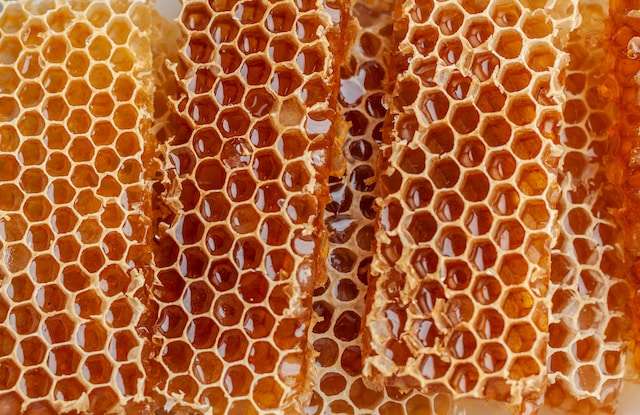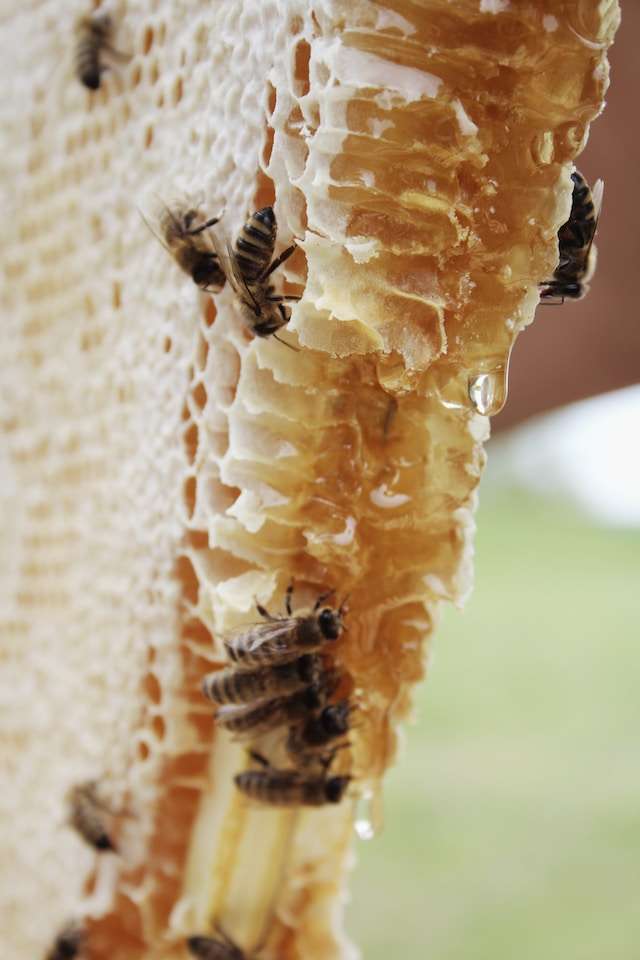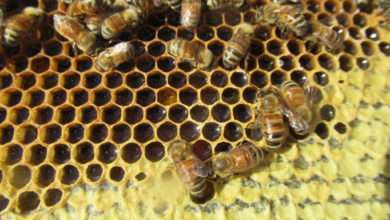Honeycomb Nutrition – Discover the Health Benefits of the Sweetest Treat

Honeycomb, the beeswax structure that houses honey, is a delicious and nutritious addition to any diet. While raw honey has long been known for its many health benefits, honeycomb takes things a step further by providing even more nutrients and health-boosting compounds. In this article, we’ll take a closer look at honeycomb nutrition, exploring the many reasons why you should include it in your diet.
Why is Honeycomb Important?
Honeycomb is not only delicious but also packed with beneficial nutrients. It is a natural source of vitamins, minerals, and antioxidants, making it a great addition to a healthy diet.
Formation of Honeycomb
Honeycomb is formed in nature by honeybees as they create their hives. Bees secrete a wax that is used to build the hexagonal form that makes up conventional honeycomb. The secretion is then chewed up by the bees and added to the different sections of the hive to form the honeycomb structure.
Nutritional Benefits of Honeycomb
Honeycomb is a natural and wholesome product that is highly regarded by many people around the world. Apart from the amazing taste of honey, honeycomb has numerous health benefits that we can all benefit from. This chapter will explore some of the nutritional benefits of honeycomb and why it is a must-have for anyone who wants to live a healthier lifestyle.
- High in Nutrients and Antioxidants
Honeycomb is packed with numerous nutrients and antioxidants that help the body stay healthy and strong. Antioxidants are essential in protecting the body against harmful free radicals that can cause cell damage. Honeycomb is an excellent source of antioxidants such as polyphenols, flavonoids, and phenolic acids.
- Rich in Vitamins and Minerals
Honeycomb is also rich in vitamins and minerals, which are essential for overall health and wellness. Vitamins and minerals are essential for various bodily functions such as metabolism, immunity, and digestion. Honeycomb contains vitamins B and C as well as minerals such as calcium, iron, and potassium.
- Contains Anti-inflammatory Properties

Inflammation is a natural response by the body to injury or infection. However, chronic inflammation can lead to various health problems such as heart disease, arthritis, and cancer. The anti-inflammatory properties of honeycomb are a result of its high antioxidant content. Honeycomb can help reduce inflammation in the body, leading to improved overall health.
- Aids in Digestion and Promotes Digestive Health
Honeycomb is a natural probiotic, which means it contains healthy bacteria that promote the growth of beneficial gut flora. These beneficial bacteria help in digestion and absorption of nutrients, leading to improved overall digestive health. Honeycomb also contains digestive enzymes that aid in breaking down food, leading to improved nutrient absorption.
How to Incorporate Honeycomb into Your Diet
If you’re ready to give honeycomb a try, here are some easy ways to incorporate it into your diet:
- Eat it Raw: The simplest way to enjoy honeycomb is to eat it raw. Break off a piece and chew it like gum, or simply swallow it whole.
- Spread it on Toast: Honeycomb makes an excellent spread for toast, bagels, or waffles. Simply smear a bit of honeycomb on top of your favorite carb and enjoy.
- Use it as a Sweetener: Honeycomb is a natural sweetener that can be used in place of sugar in many recipes. Try adding a small piece of honeycomb to your tea or coffee, or use it to sweeten your oatmeal or yogurt.
Potential Risks and Allergies
One of the most significant risks associated with honeycomb is the possibility of an allergic reaction. While honey is safe for most people, some individuals may have a severe allergic reaction to it.
Symptoms of an allergic reaction can range from mild to severe, including itching, swelling, hives, and difficulty breathing. In severe cases, an individual may experience anaphylaxis, a potentially life-threatening reaction.
Another potential risk associated with honeycomb is the presence of botulism spores. Botulism is a rare but serious bacterial illness that can cause paralysis and sometimes even death.
While the honeycomb itself typically does not contain the bacteria, it can become a breeding ground for the spores under certain conditions. Therefore, it is essential to avoid giving honey, including honeycomb, to infants under one year of age, as their digestive systems may be unable to handle the bacteria.
Precautions to Take Before Consuming Honeycomb
There are several precautions that you can take before consuming honeycomb to minimize the risks associated with it. Here are some of them:
1. Consult with your doctor if you have allergies or medical conditions.
Individuals with allergies or medical conditions should consult with their healthcare provider before consuming honeycomb. Your doctor can advise you on whether it is safe to consume honeycomb and whether any precautions need to be taken.
2. Look for high-quality honeycomb.
When purchasing honeycomb, be sure to look for high-quality and reputable brands. Do your research before making a purchase to ensure that the honeycomb is free from additives and contaminants.
3. Store honeycomb properly.
Proper storage of honeycomb is crucial to prevent the growth of bacteria. Store honeycomb in a cool, dry place away from direct sunlight, and do not expose it to too much heat.
4. Avoid giving honey to infants.
As mentioned earlier, botulism spores can be present in honey, including honeycomb. Therefore, it is essential to avoid giving honey, including honeycomb, to infants under one year of age.
Conclusion
Honeycomb is an excellent choice for those looking for a delicious and nutritious treat. It is loaded with essential vitamins and minerals and provides a great source of energy and fiber. Best of all, honeycomb nutrition offers a plethora of health benefits, including improved digestive health, reduced risk of diseases, improved immune system, and lowered blood sugar levels. So, if you are looking for a sweet treat that’s good for your health, honeycomb is definitely something you should consider adding to your diet.

FAQ
Which is healthier, honey or honeycomb?
- Both honey and honeycomb have their unique health benefits. However, honeycomb is considered to be healthier because it contains all the natural enzymes, pollens, and nutrients that are lost during the filtration process of honey.
Is honeycomb a superfood?
- Yes, honeycomb is considered to be a superfood because it is packed with vitamins, minerals, and antioxidants that can help boost the immune system and prevent chronic diseases.
Is honeycomb anti-inflammatory?
- Yes, honeycomb has strong anti-inflammatory properties due to the presence of flavonoids and phenolic acids. Regular consumption of honeycomb can help reduce inflammation in the body and prevent chronic diseases.
Is it okay to eat honeycomb every day?
- Yes, it is okay to eat honeycomb every day. However, it’s important to consume it in moderation as it is also high in natural sugars, which can lead to weight gain and other health-related issues.
How much honeycomb should you eat per day?
- It is recommended to consume one to two tablespoons of honeycomb per day to enjoy its health benefits while avoiding any excess sugar intake.
Does honeycomb have a lot of calories?
- Yes, honeycomb is high in calories and natural sugars. However, the calorie count varies depending on the type of honeycomb and the amount consumed.




